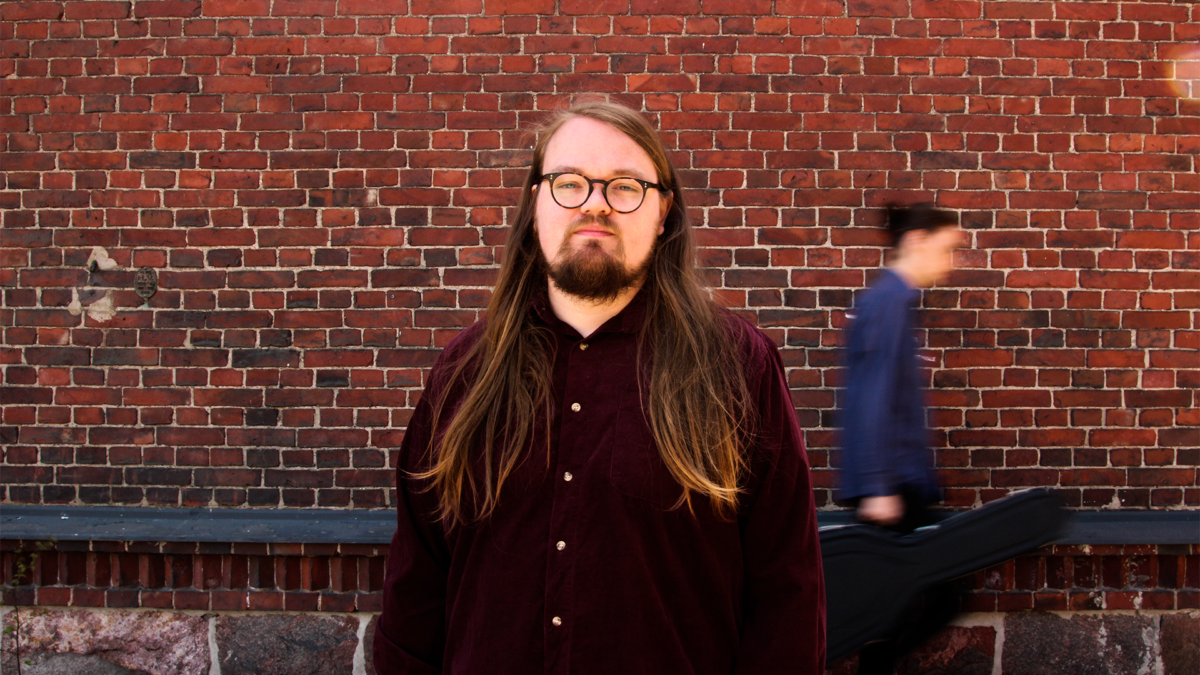Composer Þorkell Nordal: I hope that people will join the ritual
Þorkell Nordal’s “Animistic rituals” will be performed in Organo on 31st August. Þorkell answered questions on their artistry and the themes of the concert.

Who are you and what do you do?
I’m Þorkell Nordal and I’m a composer from Iceland. I’ve been living, studying and working the last five years in Helsinki. I graduated from the Sibelius Academy last December so it’s good to be back here to present my music!
How would you describe yourself as a composer?
Mostly I write for instruments, but I like to expand the sonic palette with electronic sounds. Recently I’ve been interested in vocal sounds’ expressive potential, which is also an important theme for the upcoming concert. I think a lot of my pieces influence each other – I always aim to find new approaches and contexts to the subjects that I’m interested in.
How would you describe the concert’s creating process with the guitarist Mark Reid Bulatović?
I think our collaboration has been extremely interesting. We got to know each other at the Sibelius Academy and found mutual interests to create something. Last summer we worked together for one month and started to find a common language and ideas for the project.
We figured it could be interesting to open the working process by performing. After the first month of working, we performed the first piece – a bit like a still-evolving draft. At the end of last summer, we performed the second piece. Later, Mark performed the first three pieces in his master’s concert.
Another interesting aspect of the process has been the discussions about the concert’s material. I brought the ideas relatively raw to Mark to try out and workshop. We had many constructive, critical discussions around them that I usually wouldn’t have with a performer. This process has supported my work as a composer and helped me to dig deeper to find out why I do what I do.
The process has been a new way of working for me as I usually prefer creating a piece ready all at once. It has been nice that a performer knows my ideas properly from the beginning and the pieces may still evolve after performing them. It’s special to meet someone who is ready to spend time thinking and working together like this.
How would you describe the pieces, sounds or the atmosphere of the concert?
The pieces are written for guitar and electronics. I’ve also sampled material from a vocal piece that I composed one and a half years ago that was sung by Tuuli Lindeberg. I created a short of remixes of the piece that are used for interludes or reflections between the pieces. They tie the concert together, as I think a lot of the guitar pieces’ ideas stem from the original vocal piece.
I’m using similar sounds and musical elements throughout the concert: that’s also a part of the ritualistic nature of the concert. I’m also trying to create connections between the voice and the sound of the guitar.
The pieces should be able to stand on their own. However, it is a great opportunity to create a whole event around them as the ideas and sounds may be highlighted better.
What does ritualism mean to you in the concert? What do “animistic” rituals refer to?
It means repetition of elements, focusing and meditating on certain sounds. Further, I think that the idea of a concert itself is already a ritual: The audience knows how to behave there, and the performer acts in a specific way. A certain ritualistic atmosphere is created through unusual but connected elements such as guitar cases but mainly the recurrence of sounds – sometimes to the point of obsession – is the most interesting, ritualistic aspect for me.
The name “Animistic rituals” was invented quite early in the process. Initially, this involved going through a series of rituals to discover how the instrument itself wanted to be played, focusing on a scale that better aligns with its inherent qualities. The aim was to shed our preconceived notions of what the instrument is and to treat everything as material: from the wood of the guitar and its case to even the act of changing the strings.
Despite my background as a classical guitarist, I haven’t written a solo piece for the guitar before. In this process, I have found a common language between the instrument and my musical aesthetics. Maybe it is also a part of the animism. Often my titles reflect my connection or approach while creating the piece, so I am also very glad when the audience find their personal meaning to my music.
What is especially noteworthy in the upcoming concert?
In the music I create textures with guitar and vocal sounds. I am interested in the use of different vocal expressions – voice is such a great instrument to connect noise with expressivity. I encourage people to take this journey to find and enjoy the expressivity of these different sounds. I hope the concert will have multiple noteworthy elements about it and that people will join the ritual and create their own interpretations about it.